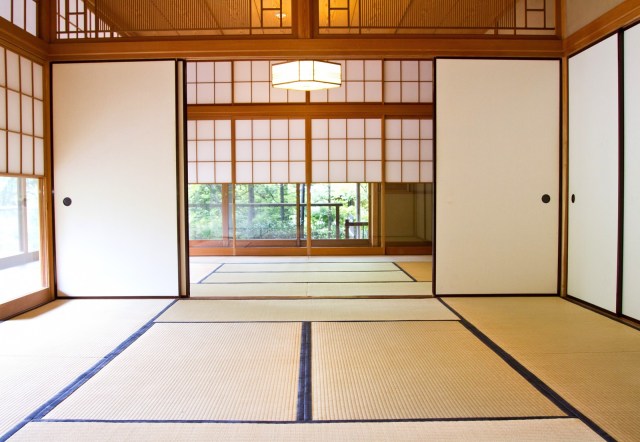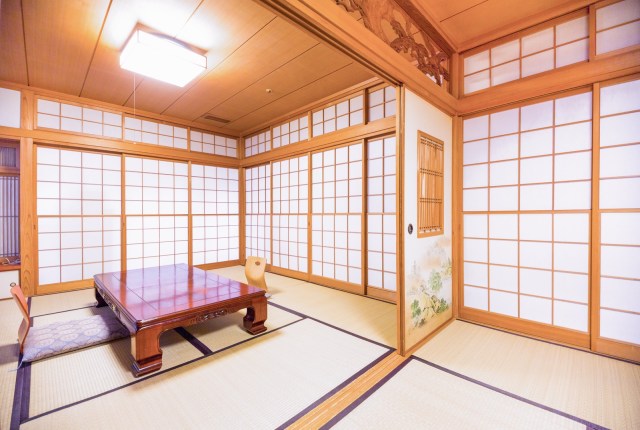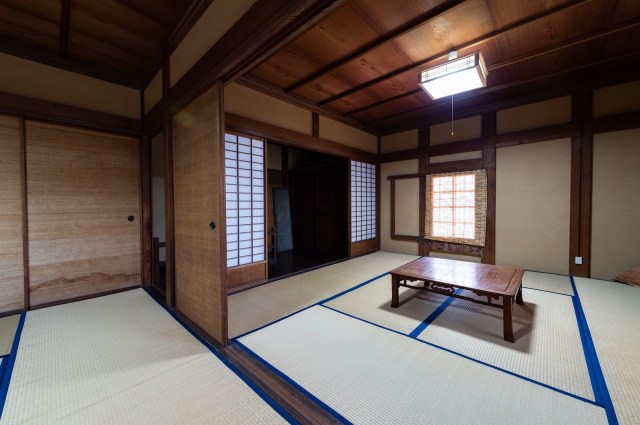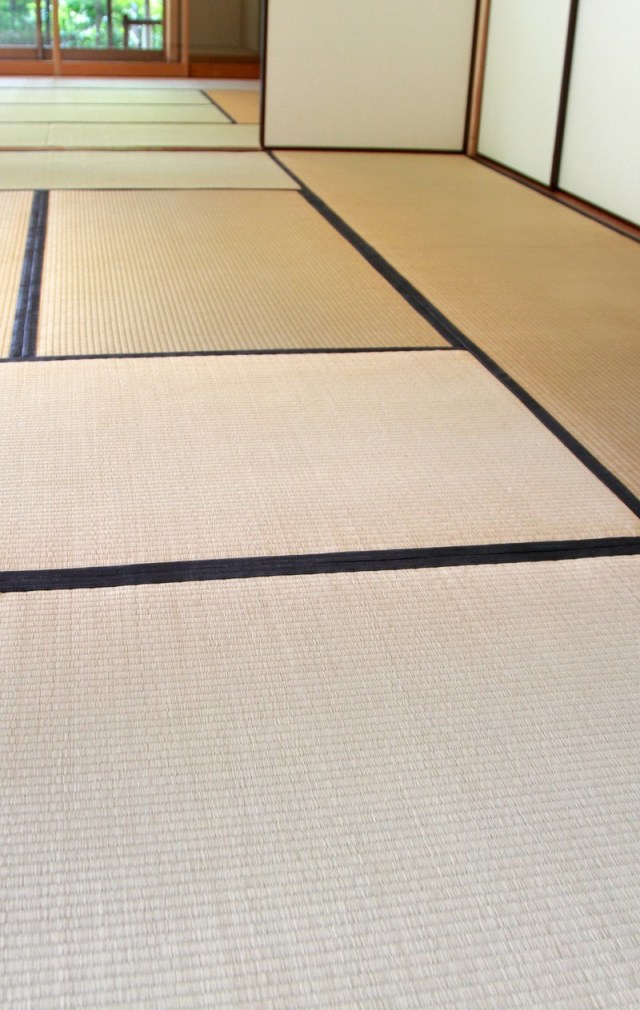
It’s a peculiar rule that even Japanese people don’t always understand.
You may know a few of the standard rules of Japanese society, like saying “Itadakimasu” before eating and taking off your shoes at the entrance of a house. But did you that when visiting someone’s home, it’s considered rude to step on the threshold of the doorway to a tatami room?
It’s a rule that has been ingrained in Japanese people’s subconscious as children, when they are often scolded harshly for stepping on the grooves of the sliding doors that open to Japanese-style rooms. Even foreigners might get some serious side-eye if they’re seen doing it, though we’re given a bit more slack, since we don’t know any better.
But what’s so bad about stepping on a doorway? Even Japanese people don’t know exactly why such a rule exists, but there are several theories. One is that, much like the difference between the inside and the outside of the house, the tatami room is seen as separate from the rest of the house, perhaps owing to the delicate nature of the mats, for one, and because the room is often reserved for traditional activities, like tea ceremonies, and praying at the family altar. As such, stepping on the threshold doesn’t respect that boundary and violates the sanctity of the space.
There’s also a much more fun theory about ninjas. Apparently, during more tumultuous times, ninjas would sneak under the wooden foundation of the house and lurk under the threshold, through which they could see the light of the room above. When the light was blocked out, they knew someone was standing on the threshold, and they used that opportunity to strike. Perhaps what was initially a habit of self-preservation eventually turned into manners as the risk of being attacked by ninjas decreased.
Of course, that story is a little bit hard to believe, because how successful would a ninja attack through the crack of a threshold actually be? On a more simple note, there’s also the idea that stepping on the threshold of a sliding door could damage or warp the grooves, which will affect the movement of the door. It’s often said that doing so is the equivalent of “stepping on the head of the host”, meaning you’re not only disrespecting them, but also hurting them.
Whatever the reason, it’s best to avoid stepping on the grooves of a sliding door, lest you offend your gracious hosts and do damage to their house. And by the way, it’s also considered rude to step on the borders of tatami mats, because in older times they used to have family crests embroidered into them, so it was seen as disrespectful. That, and, if you step on the edge you’re more likely to damage it, or push the edges downwards, which could make it easy to trip.
Tatami rooms are becoming less and less popular in Japanese homes, since they’re expensive, hard to maintain, and not very durable, so foreigners may never have to worry about it. But if you should enter a washitsu in a temple, tea ceremony school, ryokan, or other place of traditional Japanese culture, be mindful of these two simple rules and you should get along great with your hosts!
Source: Japaaan
Top image: Pakutaso
Insert images: Pakutaso (1, 2, 3, 4)
● Want to hear about SoraNews24’s latest articles as soon as they’re published? Follow us on Facebook and Twitter!





 Old dog shows new trick with very Japanese solution to toilet paper wall challenge【Video】
Old dog shows new trick with very Japanese solution to toilet paper wall challenge【Video】 How should you use the small hiroen in a Japanese ryokan hotel room?
How should you use the small hiroen in a Japanese ryokan hotel room? Japanese teacher apologizes for peeing on students’ futon during club retreat
Japanese teacher apologizes for peeing on students’ futon during club retreat Internet falls in love with cat’s first-ever encounter with carpet
Internet falls in love with cat’s first-ever encounter with carpet Japanese tatami scratching mats for “their lordships, the cats” being handmade in Kumamoto【Pics】
Japanese tatami scratching mats for “their lordships, the cats” being handmade in Kumamoto【Pics】 Foreigner’s request for help in Tokyo makes us sad for the state of society
Foreigner’s request for help in Tokyo makes us sad for the state of society Red light district sushi restaurant in Tokyo shows us just how wrong we were about it
Red light district sushi restaurant in Tokyo shows us just how wrong we were about it McDonald’s new Happy Meals offer up cute and practical Sanrio lifestyle goods
McDonald’s new Happy Meals offer up cute and practical Sanrio lifestyle goods Anime girl English teacher Ellen-sensei becomes VTuber/VVTUber and NFT
Anime girl English teacher Ellen-sensei becomes VTuber/VVTUber and NFT Historical figures get manga makeovers from artists of Spy x Family, My Hero Academia and more
Historical figures get manga makeovers from artists of Spy x Family, My Hero Academia and more Japan’s massive matcha parfait weighs 6 kilos, contains hidden surprises for anyone who eats it
Japan’s massive matcha parfait weighs 6 kilos, contains hidden surprises for anyone who eats it Celebrate another year of life by putting it in jeopardy with this birthday candle flower
Celebrate another year of life by putting it in jeopardy with this birthday candle flower Japanese ramen restaurants under pressure from new yen banknotes
Japanese ramen restaurants under pressure from new yen banknotes Limited-edition Carbonara Udon will anger noodle purists and pasta lovers 【Taste test】
Limited-edition Carbonara Udon will anger noodle purists and pasta lovers 【Taste test】 Studio Ghibli releases new action figures featuring Nausicaä of the Valley of the Wind characters
Studio Ghibli releases new action figures featuring Nausicaä of the Valley of the Wind characters All-you-can-drink Starbucks and amazing views part of Tokyo’s new 170 meter-high sky lounge
All-you-can-drink Starbucks and amazing views part of Tokyo’s new 170 meter-high sky lounge French Fries Bread in Tokyo’s Shibuya becomes a hit on social media
French Fries Bread in Tokyo’s Shibuya becomes a hit on social media New private rooms on Tokaido Shinkansen change the way we travel from Tokyo to Kyoto
New private rooms on Tokaido Shinkansen change the way we travel from Tokyo to Kyoto Studio Ghibli glasses cases let anime characters keep an eye on your spectacles
Studio Ghibli glasses cases let anime characters keep an eye on your spectacles Tokyo Tsukiji fish market site to be redeveloped with 50,000-seat stadium, hotel, shopping center
Tokyo Tsukiji fish market site to be redeveloped with 50,000-seat stadium, hotel, shopping center Beautiful Ghibli sealing wax kits let you create accessories and elegant letter decorations【Pics】
Beautiful Ghibli sealing wax kits let you create accessories and elegant letter decorations【Pics】 Studio Ghibli releases Kiki’s Delivery Service chocolate cake pouches in Japan
Studio Ghibli releases Kiki’s Delivery Service chocolate cake pouches in Japan New definition of “Japanese whiskey” goes into effect to prevent fakes from fooling overseas buyers
New definition of “Japanese whiskey” goes into effect to prevent fakes from fooling overseas buyers Our Japanese reporter visits Costco in the U.S., finds super American and very Japanese things
Our Japanese reporter visits Costco in the U.S., finds super American and very Japanese things Studio Ghibli unveils Mother’s Day gift set that captures the love in My Neighbour Totoro
Studio Ghibli unveils Mother’s Day gift set that captures the love in My Neighbour Totoro New Japanese KitKat flavour stars Sanrio characters, including Hello Kitty
New Japanese KitKat flavour stars Sanrio characters, including Hello Kitty More foreign tourists than ever before in history visited Japan last month
More foreign tourists than ever before in history visited Japan last month New Pokémon cakes let you eat your way through Pikachu and all the Eevee evolutions
New Pokémon cakes let you eat your way through Pikachu and all the Eevee evolutions Sales of Japan’s most convenient train ticket/shopping payment cards suspended indefinitely
Sales of Japan’s most convenient train ticket/shopping payment cards suspended indefinitely Sold-out Studio Ghibli desktop humidifiers are back so Totoro can help you through the dry season
Sold-out Studio Ghibli desktop humidifiers are back so Totoro can help you through the dry season Japanese government to make first change to romanization spelling rules since the 1950s
Japanese government to make first change to romanization spelling rules since the 1950s Ghibli founders Toshio Suzuki and Hayao Miyazaki contribute to Japanese whisky Totoro label design
Ghibli founders Toshio Suzuki and Hayao Miyazaki contribute to Japanese whisky Totoro label design Doraemon found buried at sea as scene from 1993 anime becomes real life【Photos】
Doraemon found buried at sea as scene from 1993 anime becomes real life【Photos】 Tokyo’s most famous Starbucks is closed
Tokyo’s most famous Starbucks is closed One Piece characters’ nationalities revealed, but fans have mixed opinions
One Piece characters’ nationalities revealed, but fans have mixed opinions We asked a Uniqlo employee what four things we should buy and their suggestions didn’t disappoint
We asked a Uniqlo employee what four things we should buy and their suggestions didn’t disappoint Princesses, fruits, and blacksmiths: Study reveals the 30 most unusual family names in Japan
Princesses, fruits, and blacksmiths: Study reveals the 30 most unusual family names in Japan 5 tips for staying healthy while traveling in Japan this winter!
5 tips for staying healthy while traveling in Japan this winter! Kyoto massage parlor would like to offer you a head rub on a self-driving tatami reed floor【Vid】
Kyoto massage parlor would like to offer you a head rub on a self-driving tatami reed floor【Vid】 200,000 yen-per-night Airbnb is the successor to Tokyo’s famous Nakagin capsule apartments【Pics】
200,000 yen-per-night Airbnb is the successor to Tokyo’s famous Nakagin capsule apartments【Pics】 Kumamoto Prefecture’s popular mascot can now be found on your floor
Kumamoto Prefecture’s popular mascot can now be found on your floor Amending Japanese crime law: names of 18 and 19-year-old criminals to no longer be concealed
Amending Japanese crime law: names of 18 and 19-year-old criminals to no longer be concealed New research suggests even low-level radiation in Fukushima negatively impacting wildlife
New research suggests even low-level radiation in Fukushima negatively impacting wildlife Tearing down the ceiling at our cheap Japanese house in the countryside【SoraHouse】
Tearing down the ceiling at our cheap Japanese house in the countryside【SoraHouse】 There’s no need to care about our staff, because they’re foreigners, says Japanese maid service
There’s no need to care about our staff, because they’re foreigners, says Japanese maid service No dinner plans for Wednesday night? Why not eat a camel hump in Tottori, like we just did?
No dinner plans for Wednesday night? Why not eat a camel hump in Tottori, like we just did? Learn all about enjoying a traditional Japanese-style ryokan inn from this nine-minute video!
Learn all about enjoying a traditional Japanese-style ryokan inn from this nine-minute video! Crazy cheap hotel in Tokyo comes with a crazy catch【Photos】
Crazy cheap hotel in Tokyo comes with a crazy catch【Photos】 Travel to Kyoto on the Kyotrain: A Japanese train with interiors like a traditional Kyoto house
Travel to Kyoto on the Kyotrain: A Japanese train with interiors like a traditional Kyoto house Is this chic hotel in Tokyo’s Asakusa district really a capsule hotel? As a matter of fact, yes!
Is this chic hotel in Tokyo’s Asakusa district really a capsule hotel? As a matter of fact, yes! 10 misconceptions Japanese people think foreigners have about Japan
10 misconceptions Japanese people think foreigners have about Japan Sorry, ladies: Yokohama’s got all-new “Japan”-themed capsule hotel rooms just for men
Sorry, ladies: Yokohama’s got all-new “Japan”-themed capsule hotel rooms just for men
Leave a Reply